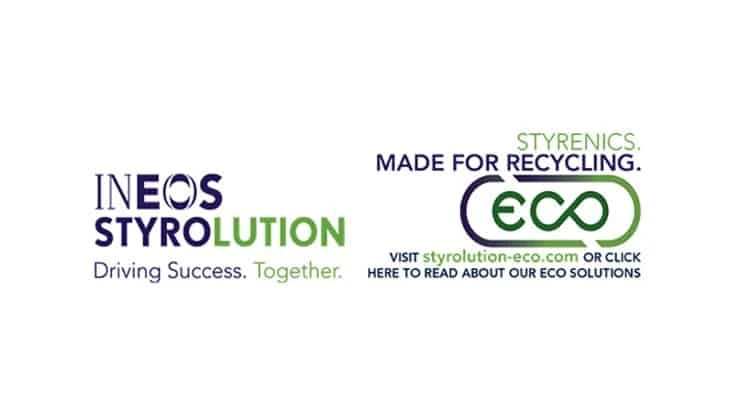
Frankfurt, Germany-based INEOS Styrolution Group GmbH says it has worked jointly with equipment firm Tomra to develop “state-of the-art technologies [to] sort post-consumer polystyrene (PS) [scrap] content with final product purity higher than 99.9 percent.”
States INEOS, “The combination of INEOS Styrolution’s investments in multiple recycling projects and Tomra’s advanced sorting technologies takes us another step closer to developing closed loop solutions for styrenics.”
Continues the firm, “Under the umbrella of Styrenics Circular Solutions (SCS), Tomra has recently completed tests revealing that PS is not only made for recycling, but also made for sorting. With Tomra’s near-infrared (NIR) sensor technology, post-consumer plastic scrap was sorted in a multi-step process, including initial sorting from post-consumer waste, grinding into smaller flakes, washing, drying and flake sorting. The resulting purity of polystyrene turned out to be higher than 99.9 percent.”
“Styrenic compounds have a unique signal that enable easy and very precise sorting, an advantage which some of the other polymers do not have,” states Jürgen Priesters, senior vice president-circular economy at Tomra.
According to INEOS, “Tomra’s findings prove that today’s sorting technologies achieve a purity level beyond what is required to successfully recycle polystyrene through both mechanical as well as advanced recycling processes. Along with INEOS Styrolution’s investments in multiple recycling projects, this takes the company another step closer to developing closed-loop solutions for styrenics.”
Access to a video portraying the sorting process can be found on this web page.
INEOS Styrolution “continues along its path to build the best recycled ABS [acrylonitrile butadiene styrene] in the world and chemically recycled polystyrene at commercial scale. The company is investing in multiple projects in Europe and in the Americas to set up recycling facilities based on the depolymerization process,” according to the firm.
“These findings on polystyrene sorting makes styrenics a material of choice for a circular economy and confirms our statement that styrenics are made for recycling like no other,” comments Sven Riechers, a vice president with INEOS Styrolution.
Latest from Waste Today
- IEG appoints Ty Rhoad to chief revenue officer
- Veralto invests in Axine Water Technologies
- Meridian Waste announces promotions and new hires
- Neste, Air Canada sign SAF supply agreement
- Municipal Waste Management merges with Collective Waste Solutions
- AMP names CEO
- Oregon DEQ rejects CAA’s second draft plan
- Texas Disposal Systems opens C&D recycling facility





